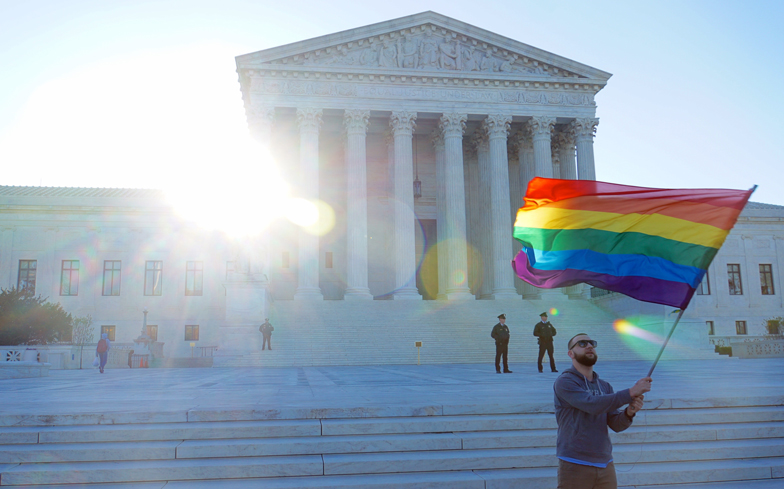
The Supreme Court is leaning in favour of a Catholic Church-affiliated adoption agency in an LGBTQ+ discrimination case.
A day after the polls closed for the 2020 US election, an LGBTQ+ case has been taken to the Supreme Court following allegations of discrimination against a Catholic Church-affiliated adoption agency.
The Church in question continues to emphasise its right to refuse potential foster parents based purely on the grounds of sexual orientation.
Arguments surrounding this the case, formally known as Fulton v. City of Philadelphia, No. 19-123, concluded on 4 November.
Nine justices heard an appeal by Catholic Social Services, part of the Archdiocese of Philadelphia, which accused the city of violating constitutional rights, specifically first amendment rights of freedom of speech and religion.
The case has been brought in front of a collection of conservative US Supreme Court justices, including newly-appointed Justice Amy Coney Barrett, whose opinions concerning LGBTQ+ rights and religious values have been held under tight scrutiny.
The case in hand surfaced after the city of Philadelphia became aware that a Catholic Church-affiliated adoption and foster care agency had deemed same-sex couples as unsuitable parents for children in the foster care system. It was in 2018 that the Philadelphia Inquirer learned that the Catholic Social Services did not certify same-sex couples.
Once the state of Philadelphia learned of Catholic Social Services’ actions, the city cited a law prohibiting sexual orientation discrimination and stopped introducing new children to the adoption service. In 2019, the city also updated its contract with foster care service providers to explicitly forbid same-sex discrimination against potential parents.
Conservative justices Samuel Alito and Brett Kavanaugh suggested Philadelphia had targeted the Catholic group over its opposition to same-sex marriage.
“If we are honest about what’s really going on here, it’s not about ensuring that same-sex couples in Philadelphia have the opportunity to be foster parents,” Alito said. “It’s the fact that the city can’t stand the message that Catholic Social Services and the archdiocese are sending by continuing to adhere to the old-fashioned view about marriage.”
During the debate, Alito and Kavanaugh both stressed the point that no same-sex couple had previously approached CSS, and that, if they had, the group would have simply referred them to another one of the city’s many agencies.
“I fully appreciate the stigmatic harm, but we need to find a balance that also respects religious beliefs,” Kavanaugh said. The associate justice also called Philadelphia’s position “absolutist” and “extreme”.
Kavanaugh also levied points in the 2015 landmark ruling, Obergefell v. Hodges, which legalised same-sex marriage, stating that overturning the ongoing case would require the court to “go back on the promise of respect for religious believers”.
This phrase holds political significance as it is the very same that Justice Anthony Kennedy included in the court’s 2015 same-sex marriage ruling.
Catholic Social Services argued that Philadelphia’s intentional exclusion from the Philadelphia’s foster care system qualifies as religious discrimination, which, in turn, also violates First Amendment rights in favour of freedom of religion.
Philadelphia has also refused to renew a $2.9 million contract for future home foster care placements by Catholic Social Services due to violated contractual terms, which includes a policy of refusing to consider same-sex married couples for placement.
“You can’t on Monday sign a contract that says we won’t discriminate and on Tuesday go ahead and discriminate,” says Katyal.
Marcel Pratt, City Solicitor of Philadelphia, concluded in a statement that Philadelphia “proudly respects and protects all of our residents’ religious freedoms, a commitment that we hold dear. But those freedoms do not allow contractors performing a City service to choose which residents they will serve based on their sexual orientation.”
A final ruling on the debate is expected to fall at the end of June 2021.



